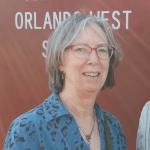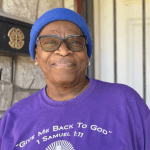Fatuma Emmad
Denver, Colorado
This interview was conducted by Mikhaela Mullins on March 22, 2022. Learn more about Fatuma’s work at www.frontlinefarming.org/.
Transcript
Can you tell me more about yourself and Frontline Farming?
My name is Fatuma Emmad and I’m the Executive Director, co-founder and head farmer for Frontline Farming. Frontline Farming is a farmer advocacy and justice organization based in the Front Range of Colorado. We serve areas around Denver and we are a Black, Indigenous, People of Color (BIPOC) and women-led organization. We’re both an education and production site, which is unique, and difficult to balance. We distribute about 200 CSAs (Community Supported Agriculture shares) and sell through other mediums, giving a quarter of all our production to five social service agencies that focus on women and children. In the past, we focused on immigrant communities as they were dealing with a lot of stigma and isolation away from federal programs and food programs. We’ve shifted in the last couple of years to focus on Black-serving organizations, particularly during the pandemic.
At Frontline Farming, we really believe in place-making so that we’re opening space, particularly land. So many of us as BIPOC people, whether in rural or urban areas, have faced this disenfranchisement outright: stealing of removal from land. So place-making and creating the opportunity for us all to grow from different forms of knowledge is very important.
We have so many other programs and cool things we do, from how we distribute our food, to art, and water advocacy. We’re farmers, first and foremost, and we really do a lot of work to serve our communities.
You mentioned the pandemic shifted your work to focus more on Black-serving organizations. What did that look like?
We’ve always been trying to step into work that supports farmworkers across the nation that look like us. So I’m proud to say that during the pandemic we understood it was the time to move forward. Many agricultural workers were being completely neglected, not distributed protective equipment, for example—laws are so confusing when it comes to these workers. And so, over the last two years, we’ve been working on setting up an organization called Project Protect Food Systems Workers in Colorado.
In 2021 we passed the most comprehensive agricultural protection bill in the nation, and while we dealt with so many reprisals from it personally and as an organization, we made it through, and it was the right thing to do. Now it’s a new era for Colorado where over 50,000 workers have joined to advocate for themselves as agricultural workers. I’m so excited about that and continuing that work, because the only thing that separates me from an ag worker is that they probably know more than me. I’m a child of immigrants myself and becoming a farm operator was a very difficult path for me. I was able to make that path, but I also had the privileges of being built on my immigrant families’ backs and having access to knowledge that allowed me to be more incredible within a white supremacist nation.
Could you share more about why this work is important to you?
I was born in Denver, Colorado, and my family is originally from Ethiopia and Yemen. Most of my young through high school years, we went back to Ethiopia and I grew up in a really international context of seeing differences and spaces between the United States and other countries in the ‘80s.
Right now, Yemen is considered one of the worst cases of famine in recent history, and what you understand about famines is that they’re not natural disasters—they’re largely man made, and many of them have causes that emanate from war. Yemen is a war that no one can understand, and that the United States has actively been involved in for over 10 years now. It’s decimated a country that was already economically impoverished.
My desire to work on food came from a very young age. Food is what sustains us; food is where you see compassion and understanding. Food is what fuels anybody to do what they can do. I followed the path of academia, working in eastern and southern Africa against genetically modified seeds, but realized I was only taking this knowledge and bringing it back to an audience of academics, which didn’t really help my people. About 15 years ago, I realized I needed to effectively become a farmer. As I learned those skills, I saw that the communities that I look like in the United States are very much suffering from the same types of things that we see across the world. So, while I still do work in Ethiopia and in international contexts, I’ve also buckled down and really grounded myself here in Colorado within our communities to continue creating land space, learning myself, and growing.
What types of water advocacy work does Frontline Farming take on?
Water, water there’s so much to say! Really, water is the blood of the earth: water serves to create life and we’re in such a time of so much contention around water. I’ve always been interested in water work and water is a very intimidating topic. It’s made to feel technocratic and academic—you have to be a water law expert in so many things in the United States—so, even for me to enter that sphere, it was always something scary and I had to slowly build and educate myself, and then just jump in. One of the things that I try to tell people is to not have that fear. We are water, you live around water; if you don’t understand a lot about what’s going on with water, it’s probably because you’re facing types of disenfranchisements from it. You need to reclaim and try to understand your connections to water. A lot of what we explore is how to make those connections and how we can advocate for ourselves, and how we work at the intersections of education, so that our communities feel equipped.
So many environmental benefits are borne by some people and so many of the distribution of bad effects are statistically borne by particular communities, and so BIPOC communities see a lot of water issues. We think a lot of Flint, but right here in Commerce City, Colorado, we’re dealing with lead in the water. It’s also one of the largest populations of Latinx communities in Colorado. How these problems happen, who’s ignored, and what gets cleaned up, that’s one whole issue in terms of water quality.
We also don’t think a lot about water quality when we’re thinking about water rights. There’s just the overall system that’s a problem: prior appropriation and first in time water rights, which completely exclude the people who were originally water right holders: our Indigenous communities. We see over and over in creation and application of laws how it’s rationalized that Indigenous people are not a part of that allocation. We very much believe in figuring out how to strategize and make interventions: for example, the Colorado Water Plan, which is being renewed this year, that’s a big point of contention for us.
It’s definitely a time of focusing on water in so many ways, and I do believe that when we hit critical points, people will start to reflect and can be better. I hope that we can do that. We [at Frontline Farming] are already there and I hope that people can start getting there sooner.
Can you elaborate on what you think the Colorado Water Plan could include?
As we’re entering the renewal, comment periods will be open on June 30, and they’ll take the rest of this year to come out with a new plan. What we saw activated on, due to certainly our research and advocacy, was the creation, for the first time, of a Water Equity Task Force in Colorado. Sadly, I found the Commission to be really ineffectual and extractive of our communities. I was nominated and represented the South Platte River Basin Roundtable, so that I could be in the room. When we began the equity task force, we were told by the organizers that no policy would come out of this; I’ve never been a part of a commission or a task force that says that. Before you’re organized, water is a contentious issue, and there are many rich people, industries, and development that have a stake in this, so a lot of people don’t understand that when nothing happens the status quo is maintained. Here, something did happen, but oppression is still happening in our communities. The Commission was created, we participated, but I don’t see much that came out of it [to benefit our communities]. It was a little bit offensive to me, coming on as a water expert and a farmer. I see the work again falling on the communities who are harmed by these things. We’ve been collecting ourselves to educate our communities and gather, to be able to submit comments that represent us and can’t be ignored.
There are particular and very clear ways in which the Colorado Water Plan can be comprehensive and at least at face value attempt to be inclusive. [But,] I really think the whole table needs to be reset: you can’t really be coming in and begging for acknowledgement.
Are there other common frustrations you encounter when it comes to equity work in particular?
Often when it comes to equity, instead of it manifesting in terms of the work itself, or say around water being equitable, what happens is organizations start talking about equity and how uncomfortable it makes them and therefore, how they need to have a training. Then the whole work becomes around equity and serving white communities so they feel more comfortable, but it has nothing to do with what we were talking about in terms of what’s happened to our Indigenous communities, and how water should be recognized for them.
Do you have any closing thoughts or a call to action that you’d like to put out to the network? What can people learn from the work that you’re doing?
Frontline Farming has partnered with the National Young Farmers Coalition and we’ve created the Colorado Water Equity Partnership and encourage you all to check that out. We will be hosting four educational talks throughout the year, with the next one coming up focused on the Colorado Water Plan. We’re looking towards creating a water fellowship that will also be BIPOC-centered, so follow that work and come to our educational talks.
And, the Colorado Water Plan is coming up: be ready to make comments! Every citizen does matter. It might feel like you don’t, but particularly around these topics, we can create change by sharing our voices. I wanted to tell people that just because there are ways that things were, or the horrible histories that we carry in the United States—of so-called manifest destiny, brutal, brutal forms of colonization and murder of communities—it does not mean that we have to continue in these paths and normalize and act like these are the things of past. History, statistics, and even what’s happening in the pandemic shows us that BIPOC communities are still made vulnerable. We so much think of supremacy and racism in terms of interpersonal relationships, but it manifests in different parts of society and that includes institutions. You do need allies; we need everyone in the struggle, our Indigenous communities can’t do this by themselves, and always do say we need others to help in these environmental causes. So, join us, we welcome all at Frontline Farming. Check out our website for our upcoming events, we welcome you and thanks for valuing my voice.
____________________________
Editor’s note: River Network receives funding from the Colorado Water Conservation Board and has partnered with stakeholders involved in the Colorado Water Plan. We are grateful to Fatuma for sharing her story and experience with the Colorado Water Plan. This interview has pushed River Network to evaluate how we show up for equity in this area of our work and shifted our thinking. As a result, our team is pursuing additional training opportunities and adjusting workplans to better support Black, Indigenous, and people of color in agricultural spaces.
About
Fatuma Emmad was born in Denver and raised in Denver and Ethiopia. She has worked farming organic and heirloom vegetables on her own acreage as part of a land co-op, setting up farms for restaurants, and as farm manager for multi-acre community farms in Milwaukee and Denver. Before becoming a farmer, Fatuma was a political scientist who engaged in issues affecting farming communities such as the push for genetically modified seeds across Southern and Eastern Africa. She believes in resistance by the world’s land caretakers to single solutions for crop productivity and seeks to work on re-framing ideas of food security. She currently serves as a Mayor appointed Member of the Sustainable Food Council, on the Denver African American Commission, Colorado Water Equity Commission, and is a 2020 and 2021 Rocky Mountain Farmers Union Fellow, and Presidente de Mile High Farmers. Fatuma is also the recipient of the Kathy Underhill Inaugural scholarship recognizing a community member who is changing hearts and minds in the hunger space with advocacy, policy, and/or community engagement through the lens of health equity. In 2021, Fatuma was also recognized as 1 of 50 leaders across the nation for the Black Voices for Black Justice fund. The Black Voices for Black Justice Fund supports and recognizes Black leaders and Black-led organizations on the front lines of shaping the urgent movement to build a fair, equitable, and anti-racist America.







